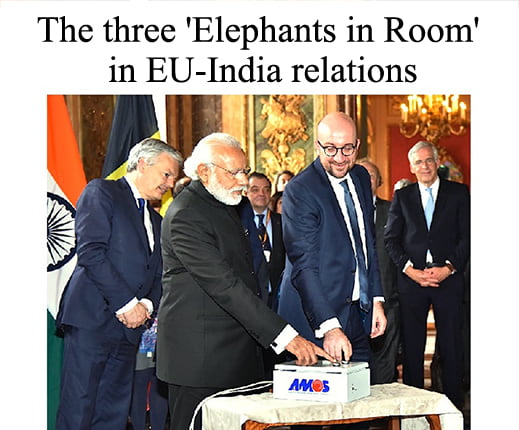The virtual summit between the EU and India was held last month with the three ‘elephants in the room.’
The collaboration policies with China have generally been practiced by both India and the EU, but the relationships have plumbed new depths during the pandemic.
China was the largest elephant, with the other two being trade and human rights.
China’s ‘mask diplomacy’ in EU member states and the deadly border attack with India by Chinese soldiers created huge worries among India and EU.
The Indian and European interests converge on the Belt and Road Initiative (BRI), a global plan for infrastructure growth that the Chinese government adopted in 2013.
The exploitation of divisions by China within Europe is similar to the experiences of India in its South Asian neighbourhood.
Despite the difficulties, India shares borders and territorial issues, and Europe has massive economic ties with China.
Both India and Europe have awoken to the reality of increasing Chinese influence in their neighbourhoods and are re-examining their equations with Beijing.
Most of the cooperation areas explored during the summit included a connection to China: Strengthening the multilateral rules-based global order; digital cooperation and developing global standards for 5G and AI; security and maritime cooperation including preserving stability in the Indian Ocean region, cooperation in the Indo-Pacific, and enhancing connectivity.
The second elephant in the room
A highlight of the summit was the decision to establish a high-level ministerial dialogue on trade and investment. This is likely to break the long-running crisis in the European Union-India Free Trade Agreement (FTA) negotiations.
The world has changed significantly since the earlier negotiation. The prevention of the Pandemic’s economic crisis is an immediate goal for most nations.
Based on the parallel inquiries of India and Europe on reducing China’s economic dependence, the China component will enable new readiness for practicality and possible concessions on certain sticking points.
After Brexit, India’s traditional launchpad into the European market will no longer be there.
EU officials are concerned about India’s recent declarations of “self-reliance” that could lead to more protectionism. These come amid popular calls for a boycott of Chinese products.
If India is more economically competitive, it will influence Asia’s overall balance of power, thus advancing strategic interests in Europe and India.
The third elephant
The issue of human rights was certainly the third elephant in the room.
The global impact of the Pandemic has brought the European Union and India closer together.
The postponement of the summit in March because of Covid-19 has been a benefit for the relationship.
Global developments have deviated from European Parliament resolutions passed in February, criticizing India’s actions in Kashmir and the Citizenship Amendment Act (CAA).
India fears foreign intervention and has traditionally pursued diplomacy within the realm of non-alignment and strategic autonomy.
Charles Michael, President of the Council of the European Union, emphasized his faith in Indian institutions and raised the CAA, and the leaders agreed to revive the human rights discourse.
The EU-India Strategic Partnership is based on shared values.
European professions on ‘cooperation with China, but shared values with India’ demonstrate how value discourse can become important once again.
Therefore, calls for participation should be conditional on adequate human rights from time to time from any number of EU institutions.


Comments are closed.